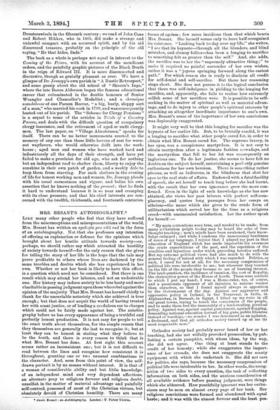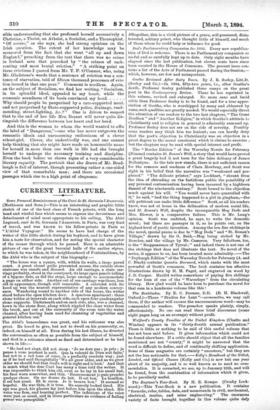MRS. BESANT'S AUTOBIOGRAPHY.*
LIKE many other people who feel that they have suffered from the misconceptions and misrepresentations of the world, Mrs. Besant has written an apologia pro vitci suet: in the form of an autobiography. Not that she professes any intention of offering an explanation or defence for the opinions which brought about her hostile attitude towards society—or, perhaps, we should rather say which attracted the hostility of society towards herself—for the only reason that she gives for telling the story of her life is the hope that the tale may prove profitable to others whose lives are darkened by the same troubles and doubts which she has experienced in her own. Whether or not her book is likely to have this effect, is a question which need not be considered. But there is one result which may attend her labours, and not an undesirable one. Her history may induce society to be less hasty and more charitable in passing judgment upon those who rebel against the opinion of the majority That Mrs. Besant has herself chiefly to thank for the unenviable notoriety which she achieved is true :enough ; but that does not acquit the world of having treated her with scant justice, or of lending a credulous ear to charges which could not be fairly made against her. The autobio- graphy before us has every appearance of being a truthful and perfectly honest production. It is not easy for people to tell the exact truth about themselves, for the simple reason that they themselves are generally the last to recognise it; but at least they can be honest in stating what they believe to be the truth, and there is every reason to think that is what Mrs. Besant has done. At first sight this account seems rather an inconsistent one; but it is not difficult to read between the lines and recognise how consistent it is throughout, granting one or two unusual combinations in the character. And, seen from this point of view, the self. drawn portrait is by no means without interest. It is that of a woman of considerable ability and but little knowledge, of an independent mind and very dependent affections, an alternate prey to religious fervour and religious doubt, unselfish in the matter of material advantage and painfully self-centred, possessed of most of the Christian virtues, but absolutely devoid of Christian humility. There are many
• Annie Besant: an Autobiography. London : T Fishers* Elwin.
I forms of egoism ; few more insidious than that which besets Mrs. Besant. She herself seems only to have half-recognised its existence. "Looking back to-day over my life," she writes, "I see that its keynote—through all the blunders, and blind mistakes, and clumsy follies—has been a longing to sacrifice to something felt as greater than the self." And, she adds, the sacrifice was to her the "supremely attractive thing ;" to make it required no painful surrender of her own wishes, rather it was a "joyous springing forward along the easiest path." For which reason she is ready to disclaim all credit for self-denial and self-sacrifice. But there her reasoning stops short. She does not pursue it to the logical conclusion that there was self-indulgence in yielding to the longing for sacrifice, and, apparently, she fails to realise how extremely selfish some of her sacrifices were. It is possible to be self- seeking in the matter of spiritual as well as material advan- tage, and to do injury to other people's spiritual interests by attaching an altogether inordinate importance to one's own.
Mrs. Besant's sense of the importance of her own convictions was deplorably exaggerated.
It might very well be that this longing for sacrifice was the keynote of her earlier life. But, to be brutally candid, it was a longing to sacrifice what other people cared for, in order to obtain what Mrs. Besant cared for. The supreme luxury, in her eyes, was a conspicuous martyrdom. It is not easy to obtain martyrdom after a legitimate fashion nowadays, and the martyrdom that fell to her lot was consequently an inglorious one. To do her justice, she seems to have felt no doubts on the subject herself, entertaining a perfectly genuine enthusiasm for her own heroism. There is something rather piteous, as well as ludicrous, in the blindness that shut her eyes to the real state of affairs. Endowed with a fatal facility of speech, she set herself to teach long before she had learnt, with the result that her own ignorance grew the more con- firmed. Even in the light of such knowledge as she has now attained, she views her past labours with perfect self-com- placency, and quotes long passages from her essays on atheism—the name which she gives to the crude form of utilitarianism which served her for the time as a religions creed—with unconcealed satisfaction. Let the author speak for herself
My main contentions were true, and needed to be made; from many a Christian pulpit to-day may be heard the echo of free- thought teaching ; men's minds have been awakened, their know- ledge enlarged ; and while I condemn the unnecessary harshness of some of my language, I rejoice that I played my part in that education of England which has made impossible for evermore the crude superstitions of the past, and the repetition of the cruelties and injustices under which preceding heretics suffered. But my extreme political views had also much to do with the general feeling of hatred with which I was regarded. Politics, as such, I cared for not at all, for the necessary compromises of political life were intolerable to me ; but wherever they touched on the life of the people they became to me of burning interest. The land-question, the incidence of taxation, the cost of Royalty, the obstructive power of the House of Lords. These were matters to which I put my hand ; I was a Home-ruler, too, of course, and a passionate opponent of all injustice to nations weaker than ourselves, so that I found myself always in opposition to the Government of the day. Against our aggressive and oppressive policy in Ireland, in the Transvaal, in India, in Afghanistan, in Burmah, in Egypt, I lifted up my voice in all our great towns, trying to touch the consciences of the people, and to make them feel the immorality of a land-stealing, piratical
policy. Against war, against capital punishment, against flogging, demanding national education instead of big guns, public libraries
instead of warships,—no wonder I was denounced as an agitator, a firebrand, and that all orthodox society turned up at me its most respectable nose."
Orthodox society had probably never heard of her or her teaching, had she not wilfully provoked prosecution, by pub- lishing a certain pamphlet, with whose ideas, by the way, she did not agree. One thing at least stands to the credit of her honesty; while she exaggerates the import- ance of her crusade, she does not exaggerate the scanty equipment with which she undertook it. She did not care for politics, she says, because the necessary compromises of political life were intolerable to her. In other words, the recog- nition of two sides to every question, the task of collecting information on both sides, and the anxious consideration of
all available evidence before passing judgment, were things which she abhorred. How youthfully ignorant was her enthu- siasm may be seen on almost every page of her book. Her religious convictions were formed and abandoned with equal baste; and it was with the utmost fervour and the least pos.
sible understanding that she professed herself successively a Christian, a Theist, an Atheist, a Socialist, and a Theosophist. "Of course," as she says, she had strong opinions on the Irish question. The extent of her knowledge may be measured from the fact that she went "all up and down England," preaching from the text that there was no crime in Ireland save that provoked by "the crimes of rack- renting and most brutal eviction." "A striking point on these evictions I quoted from Mr. T. P. O'Connor, who, using Mr. Gladstone's words that a sentence of eviction was a sen- tence of starvation, told of fifteen thousand processes of evic- tion issued in that one year." Comment is needless. Again, on the subject of Socialism, we find her writing, "Socialism, in its splendid ideal, appealed to my heart, while the
economic soundness of its basis convinced my head Why should people be pauperised by a rate-supported meal, and not pauperised by State-supported police, drainage, road- mending, street-lighting, &c.?" One is driven to suspect that to the end of her life Mrs. Besant will never quite dis- tinguish the difference between her heart and her head.
And this is the woman to whom the world wanted to affix the label of "Dangerous,"—one who has never outgrown the romantic ideals and unreasoning enthusiasm of a clever school-girl. Clever, she undoubtedly was, and one cannot help thinking that she might have made an honourable name for herself in more than one walk in life had she brought herself to undergo the necessary training and discipline. Even the book before us shows signs of a very considerable literary capacity. The portrait that she draws of Mr. Brad- laugh is full of interest, though presenting rather a one-sided view of that remarkable man; and there are occasional passages which rise to a. high point of eloquence.







































 Previous page
Previous page